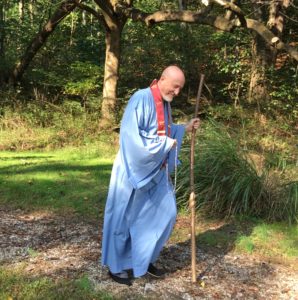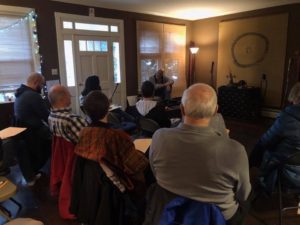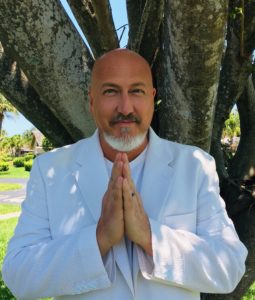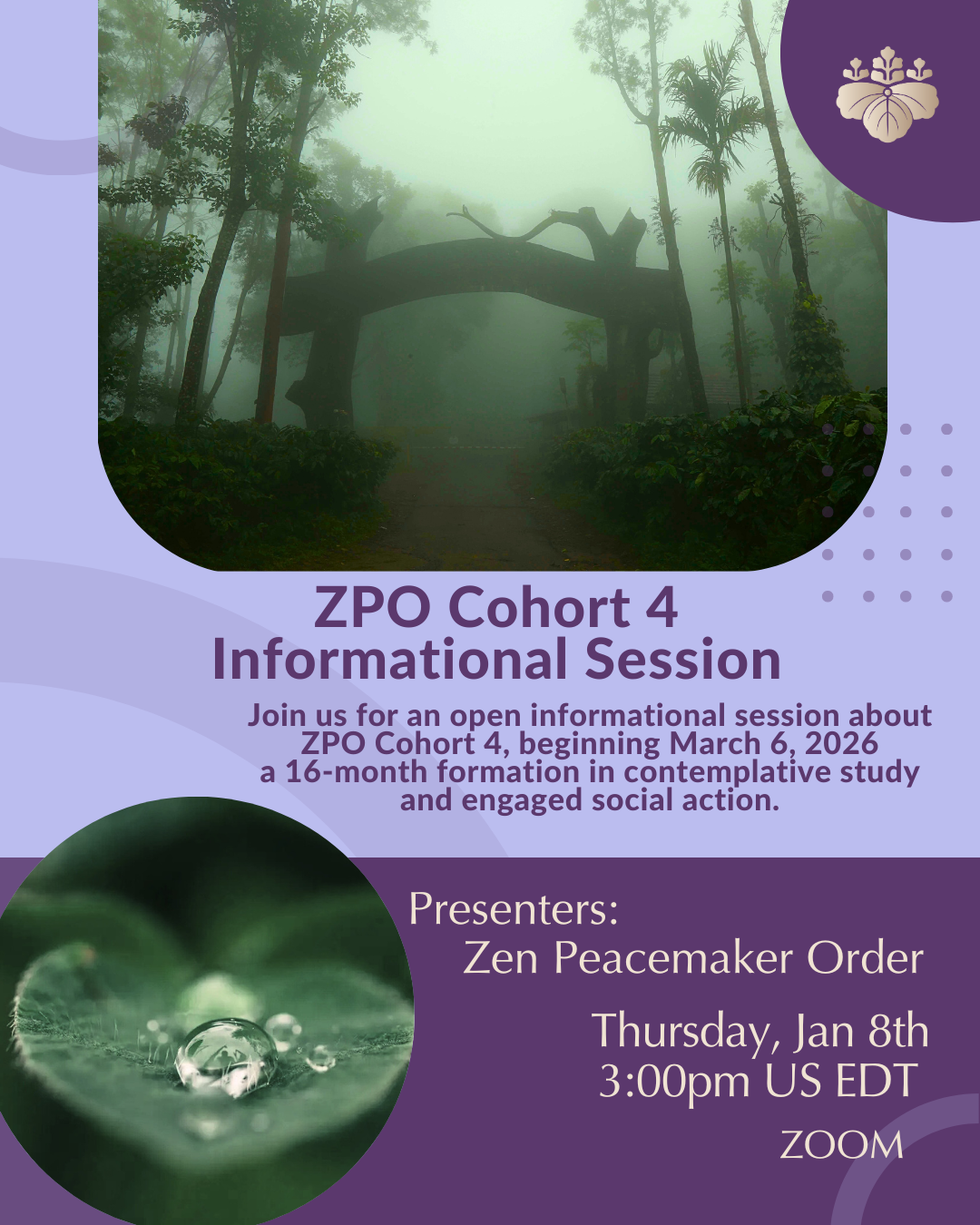ZPI encourages reflections from retreat participants, staff, members & others touched by our work and doing similar work from around the world, as part of the practice of bearing witness. In this article, ZPI Affiliate Anthony Stultz from “Dragonfly Sangha” brings us on a personal journey with how he came to meet Bernie Glassman and became apart of the Zen Peacemaker Family.
HARRISBURG, PA, USA. I first met Bernie when I was attending graduate school in Cambridge, Massachusetts. I was taking a class on Buddhism, taught by Dr. Christopher Queen, at Harvard University; we were studying a book called Zen in America and one of the chapters was devoted to a man named Bernie Glassman. I found that he as a person and the details of his background really resonated with me. My own lineage has Jewish family members and, because of my father, I grew up with many entrepreneurial adventures: retail stores, roller skating rinks, car dealerships, dairy farms and everything else under the sun. And so, as I read about Bernie, he seemed to be very familiar and someone I thought I would understand and be able to connect with.
So I decided, as I often want to do with folks that impress me, that I would reach out to him and share an idea that I was developing around creating a new order of Buddhist clergy that would engage with the world in various and diverse ways. I laid out my concept in a letter that was about eight pages long and I sent it off. I let go of what might happen from there. One day, a couple of weeks later, I returned home from classes and my wife said that I had received a wire from a Bernie Glassman. Much to my surprise, there was a short line saying that he had read my letter and loved it and that we must get together when he was back from India.
A month later we met for the first time in his office in New York and, in his words, we really “grokked;” we very quickly found that we had many of the same ideas and shared a similar vision. Up to that point in my ministry, along with helping to oversee a spiritual community, I (along with my father, who was a very socially engaged and compassionate person) had created various outreach programs. I also did a lot of work in federal, local and state prisons, coming in from the outside and working with inmates and their families. In addition, we created a halfway house that I ran for five years. I shared with Bernie my experience with homelessness while traveling and how my family thought that I would end up a wandering itinerant hobo preacher. We shared a love for the way of the open road and a fondness for the play, “The Iceman Cometh.” We just had so many things that connected, and I very quickly got involved with the Zen community in New York and was on the Board of Directors for a short period of time.
This, of course, was when Bernie was beginning the creation of the Zen Peacemaker Order, which is what it was called back then. I got to know his wife, Sandra Jishu Holmes, and study liturgy with her. I also introduced Bernie to my teacher from Harvard, Christopher Queen, and we would go down to the tough part of Yonkers on the weekends, staying at the hermitage, meditating by a condemned school that was a hangout for drug addicts.
 In 1996 I invited him to come to Harvard to speak; it was the same weekend as his birthday and it was also the time of the big Buddhism in America conference. It was a great personal experience for me, including an interesting breakfast with Peter Matthiessen and an intriguing lunch with Jon Kabat-Zinn. One inspired the writer in me and the other, to create my own approach to mindfulness. I was also able to connect Bernie with some other people I knew at Harvard and some friends of mine from the local Cambridge Buddhist community. The conclusion of that wonderful weekend was attending together the outdoor Eucharistic celebration for the homeless in the Boston Common being performed by a friend of mine who was an Episcopal priest, and having a cigar together. As I said, this was the beginning of everything; I was working on ideas for what the seminary program might look like for the Zen Peacemaker Order and Bernie and I even talked about setting up a branch at the seminary I was attending, that he and I would create together and oversee. It was an exciting time!
In 1996 I invited him to come to Harvard to speak; it was the same weekend as his birthday and it was also the time of the big Buddhism in America conference. It was a great personal experience for me, including an interesting breakfast with Peter Matthiessen and an intriguing lunch with Jon Kabat-Zinn. One inspired the writer in me and the other, to create my own approach to mindfulness. I was also able to connect Bernie with some other people I knew at Harvard and some friends of mine from the local Cambridge Buddhist community. The conclusion of that wonderful weekend was attending together the outdoor Eucharistic celebration for the homeless in the Boston Common being performed by a friend of mine who was an Episcopal priest, and having a cigar together. As I said, this was the beginning of everything; I was working on ideas for what the seminary program might look like for the Zen Peacemaker Order and Bernie and I even talked about setting up a branch at the seminary I was attending, that he and I would create together and oversee. It was an exciting time!
A couple of things stand out in those halcyon days, like when would we ended up at a party in New York City with all kinds of celebrities and Bernie would often stay off to the side, watching everyone. It was almost like he was shy sometimes. When he visited Cambridge, he and his wife stopped in at my apartment. My little son had made a paper mask for Bernie to place on his home altar and he put the mask on and got down on the floor and played with my son like he was the only person in the world. I remember when we went over to do the presentation at Harvard Divinity School that he seemed very tired. I asked how he was feeling and if he was still up to doing the talk, as I knew he was having a very busy and demanding weekend. Of course he said that he was. As a huge throng of people showed up, it was just amazing to see him go from someone who was very tired from all the traveling and teaching come alive and expound the Dharma with a whole new burst of energy.
I intended to stay in Massachusetts to do my clinical chaplaincy training when I finished seminary, but I ended up going to Hershey Medical Center to be closer to my father, who had had heart surgery and was then living in that part of Pennsylvania. Around the same time I found out that sadly, as he was relocating to New Mexico, Bernie’s wife Sandra had a heart attack and died. I remember having a very vivid dream of Bernie at that time; as a matter of fact, the title of this sharing comes from that dream. It was inspired in part by the times in Yonkers when just he and I would spend time together at a diner, talking. We called it my “diner dokusan.” I have really sweet memories of that. So in this dream, I was wandering down a foggy, rainy city street when I looked up and saw this half lit neon sign which read, “Bernie’s Diner.” I came to the door and there he was, standing behind the counter chomping on a cigar wearing a stained white apron with this big smile on his face. All kinds of people were coming in and out with all sorts of needs, all kinds of hungry ghosts, and Bernie fed them whatever they needed with whatever he had. He presented the joyous, Supreme Meal of life.
I’ve been fortunate to have mentors like Bernie and great teachers like Alfred Bloom and Christopher Queen. They were always very supportive of me and really wanted me to do my own thing and to venture out and engage in Dharma experiments: to explore new skillful means of community gathering, liturgy, robes and practices. While Bernie and Al came from the classical Zen and Shin tradition respectively, they encouraged me to create something new.
So I took the plunge: after I was done working at the hospital, my wife and I decided to stay in the Harrisburg area as it was nice place to raise our son. I began doing retreats, first for hospital personnel and then for the larger community. That was about 23 years ago. Together with my students, we officially founded the Blue Mountain Lotus Society, which I named after the local Blue Mountain Range and also the American Lotus that grew in the Wildwood wildlife preserve nearby. It has now become the Dragonfly Sangha. I started doing retreats in a beautiful remodeled barn and the local Unitarian church. Then my father, who was the great patron of my work, and I separately came across the same pretty property on the same day and we decided that this would be the place to make a spiritual home. We had a big opening ceremony attended by over a hundred people and delegates from different faiths, with Chris Queen presiding and a special written blessing from Bernie.
At the same time, I decided to create a school to train people in the specific practices and techniques that I was creating and grow an order of clergy to carry out our engaged approach to the Dharma. In addition to our mother temple in Harrisburg, we now have centers, which we call Houses of Meditation, in Lancaster, Pennsylvania and Henderson, Nevada. Additionally, we now have affiliate sangha members and clergy in California, Connecticut, and Florida. So, we’ve grown a good bit and our seminary program continues to train and support new Dragonfly clergy.
One of the primary ways in which we have engaged the larger society is by providing a form of pastoral counseling (The Four Directions System of Mindfulness) that I created to help provide a Buddhist based psychotherapeutic mindfulness model to help relieve suffering. Another way we do this is by being a big part of the interfaith community locally, nationally and even internationally, with Bernie’s idea of The House of One People serving as a foundational inspiration. I was honored a few years back to be a Buddhist ambassador to the World Congress of Religion and I remember as I was preparing my paper for presentation at that event, I reached out to Bernie; he was very supportive and loved what I was doing. I was also asked to be one of the three clergy to perform the burial for remains of the victims of the 911 flight 93 tragedy. I remember there was a teenage Japanese man who had died in the crash who had loved all things American, not unlike the way that, when I was a boy, I loved all things Japanese. It was a very humbling and poignant time that I was able to spend with all those families and particularly that Japanese family, whose son I honored with a dharma name. Out of this experience grew a Bearing Witness Day, which we have held at the memorial site.
After Bernie’s stroke in 2016, Chris and I went to visit him at his home in Massachusetts; I ended up doing an impromptu video interview with him which I later wrote up and published. The thing that so impressed me at the time was how his practice had prepared him to use something that is so devastating as an opportunity to grow spiritually. He shared how, in the past, he was a person who was always fiercely focused on getting things done and that this sometimes negatively impacted his interpersonal relationships. However, as he was being cared for by his wife, Eve, and so many others he felt such great appreciation and gratitude; he found that his heart expanded and he more deeply understood all the ways in which we are supported by Oneness in our daily lives. He was able to turn a crisis into an opportunity for spiritual growth.
In February of 2019, Chris and I made another journey to Yonkers together. We were there to join in the celebration of his life and works. It was wonderful to see the huge gathering of persons who in one way or another had been indelibly touched by his being. I am still learning from Bernie. I believe that nothing can separate us from Oneness, not even death. I continue to walk with him in my daily life, and try to honor him through the practice of just being and sharing the way of liberation. Every time I reread one of his books, watch a video or remember his personal words to me, my own understanding of the Three Tenets deepens.
So, my great thanks to Geoff and Kayleigh for giving me an opportunity to share my love for Bernie and my great fortune at having him as one one of the great spiritual inspirations of my life. I am grateful to have known him at the beginning of the Zen Peacemaker Order and to see the genesis of those ideas now turn into this great compassionate organization of spiritual friends called the Zen Peacemakers International. And I trust, from the good folks that I’ve met and who are carrying out the mission, that his vision will continue to grow.
Finally, in our Dragonfly sangha we annually remember Bernie, and all of my other spiritual teachers and mentors that have crossed over, honoring him with a special liturgy, always asking, “We know you are here, Roshi. Why can’t we see you?” Our invocation is heard and subtly answered in all those lives that his spirit continues to enlighten.
About the Author:
 Anthony Stultz, aka ‘Sensei Tony’, is a Buddhist minister and mindfulness teacher. He is the founder and Director of The Dragonfly Sangha (1996), and The Blue Lotus School of Mindfulness Arts (1999). A leader in contemporary spirituality, his works on mindful living have appeared in both popular journals and academic books like Mindful Magazine, Lion’s Roar, Buddhadharma, and Engaged Buddhism in the West (2000). In 2013 he received the World Affairs Council Torch of Global Enlightenment. He is a filmmaker (1st prize at Tricycle Magazine “Awake in the World” short film showcase) the author of the award winning book, Free Your Mind: The Four Directions of an Awakened Life (2007), and his exciting new release, The Three Principles of Oneness: How Embodying The Cosmic Perspective Can Liberate Your Life (2019) was chosen for presentation at the prestigious Miami Book Fair.
Anthony Stultz, aka ‘Sensei Tony’, is a Buddhist minister and mindfulness teacher. He is the founder and Director of The Dragonfly Sangha (1996), and The Blue Lotus School of Mindfulness Arts (1999). A leader in contemporary spirituality, his works on mindful living have appeared in both popular journals and academic books like Mindful Magazine, Lion’s Roar, Buddhadharma, and Engaged Buddhism in the West (2000). In 2013 he received the World Affairs Council Torch of Global Enlightenment. He is a filmmaker (1st prize at Tricycle Magazine “Awake in the World” short film showcase) the author of the award winning book, Free Your Mind: The Four Directions of an Awakened Life (2007), and his exciting new release, The Three Principles of Oneness: How Embodying The Cosmic Perspective Can Liberate Your Life (2019) was chosen for presentation at the prestigious Miami Book Fair.
Anthony with be leading the Zen Peacemakers Monthly Members Meeting in October. Please follow this link to learn more and register for this event.



